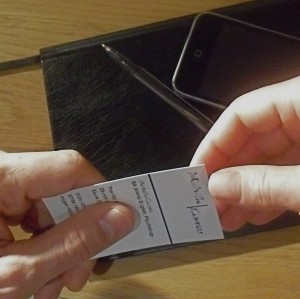Creating an International Business Card
 A business card is an important tool for networking and it really comes into its own when you move abroad and begin a new network—social as well as professional. Even if you have never had a business card, strongly consider one for your overseas move.
A business card is an important tool for networking and it really comes into its own when you move abroad and begin a new network—social as well as professional. Even if you have never had a business card, strongly consider one for your overseas move.
The most important things to remember when creating a business card are:
- Make it easy for people to see what you do, and
- Make it easy for them to reach you.
- Unless you have a very good tag line, the business card is not the place to advertise any more than these basic facts.
Try to leave the back of the business card blank so any information that arises in your conversation can be written, briefly, here. This is an easy technique that can help the recipient of your business card to remember you better.
What to include:
- Your name and title (useful when names might not clearly show gender in other countries),
- Your company’s name and address or your business, if freelance,
- Your telephone number (direct line to you, not a switch board number),
- Your cell/mobile number,
- e-mail address,
- Any relevant website information.
When to hand them out:
Carry your cards with you everywhere, kept them clean and tidy in a small case. You may meet a potential client or connection anywhere and networking is especially crucial when overseas. The business card can be used for business connections as well as social connections that will help you build your overseas network, from school parents to friends in an evening language class.
e-business cards or not?
Pros:
- Paperless
- No worries about keeping cards pristine
- If you have your PDA or some cell/mobiles, then you have your cards
- You know they won’t lose the card because the info is already stored.
Cons:
- Much easier to exchange paper cards than to pause and enter info into a mobile or PDA
- Paper cards are more personal and as mentioned above, you can add more relevant info at the time of meeting
- Not everyone has an e-business card compatible device, and even if they do, not everyone has an application for exchanging contact info easily.
Other versions of e-business cards:
Facebook and MySpace:
If you use these social network sites decide if they will be for friends or business. Do not try to combine the two or you will inevitably lose some control over what is divulged about yourself to business associates, and potential business associates.
Twitter:
Good tweeting is like good blogging—it is best to choose a niche. If you’re using Twitter for business, focus solely on your business and offer useful tweets regarding what you do, e.g. tips on saving money if you’re a financial advisor, or inside info on places to visit if you’re a travel writer.
Linked In:
This site offers a great way to have a dynamic, online CV (resume). With a Linked in account you can upload relevant information from work history, current projects, projects you would be interested in, areas of expertise, and current location. You can also upload further links, such as your website. One useful tool is receiving recommendations from other people. Used well, Linked In can be a very useful online business card/CV.
